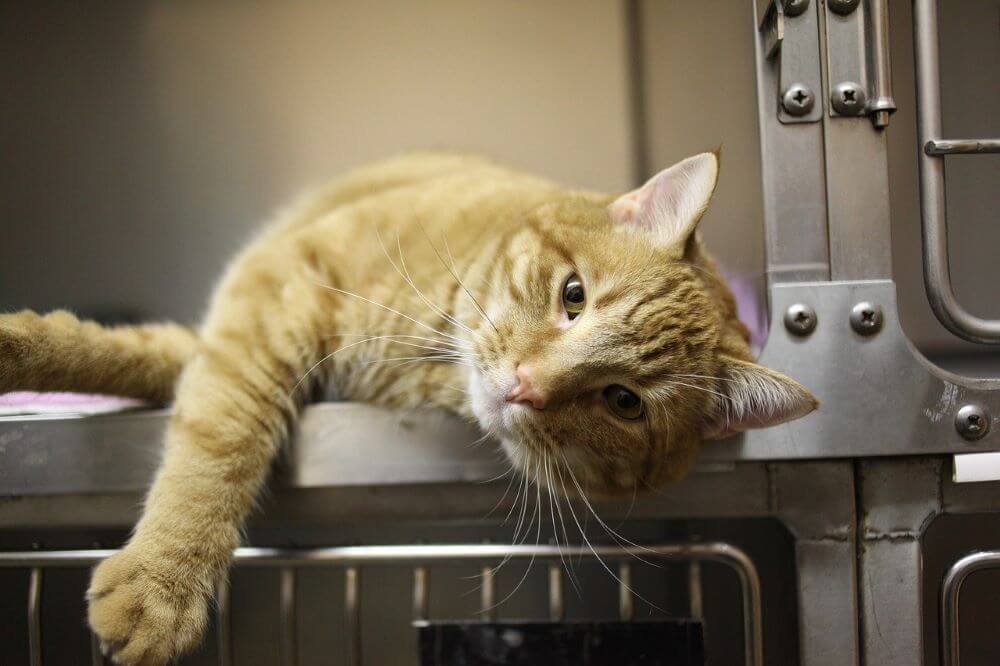
If there was a “difficult feline diseases” award, feline pancreatitis would certainly be in the running. It is difficult to diagnose, difficult to treat, and difficult to determine what causes it. Pancreatitis in cats is relatively rare, reportedly affecting less than 2% of cats.
Despite its rarity, this disease is quite serious and can be fatal, so it’s important for cat parents to learn more about feline pancreatitis and how it’s treated.
Quick Overview: Pancreatitis in Cats
 Other Names: Inflammation of the Pancreas
Other Names: Inflammation of the Pancreas
 Common Symptoms: Vomiting, weight loss, lack of appetite (anorexia), abdominal pain, diarrhea.
Common Symptoms: Vomiting, weight loss, lack of appetite (anorexia), abdominal pain, diarrhea.
 Diagnosis: General bloodwork especially measuring serum pancreatic enzymes amylase and lipase, feline specific pancreatic lipase immunoreactivity (fPLI), ultrasound, x-ray. Pancreatic biopsy is rarely used due to its invasive nature.
Diagnosis: General bloodwork especially measuring serum pancreatic enzymes amylase and lipase, feline specific pancreatic lipase immunoreactivity (fPLI), ultrasound, x-ray. Pancreatic biopsy is rarely used due to its invasive nature.
 Requires Ongoing Medication: No
Requires Ongoing Medication: No
 Vaccine Available: No
Vaccine Available: No
 Treatment Options: Mainstays of treatment include anti-nausea/vomiting medication, appetite stimulant medication, pain medication, and fluid therapy. In milder cases, fluids under the skin may be sufficient but more severe cases may require intravenous fluids.
Treatment Options: Mainstays of treatment include anti-nausea/vomiting medication, appetite stimulant medication, pain medication, and fluid therapy. In milder cases, fluids under the skin may be sufficient but more severe cases may require intravenous fluids.
 Home Remedies: Providing small frequent meals and encouraging eating is vitally important to recovery.
Home Remedies: Providing small frequent meals and encouraging eating is vitally important to recovery.
Pancreas Basics
What is the pancreas, anyway? It’s well known that the pancreas secretes insulin, the hormone that keeps blood sugar levels in check. However, the pancreas is more than just an insulin-secreting machine.
This oddly-shaped organ is located under the stomach on the right side of the body. From a functional standpoint, the pancreas has two parts: endocrine and exocrine. The endocrine part secretes insulin. The exocrine part secretes digestive enzymes that travel down to the small intestine to help break down food.
These digestive enzymes are potent, so the pancreas keeps them tucked away and inactive until they reach the small intestine. This will be important to remember when we talk about what happens during pancreatitis.
Causes of Pancreatitis in Cats
Although there are several potential causes of feline pancreatitis, most cases (> 90%) of the disease have no known cause. Some potential causes include severe blunt trauma (falling from a high height), infectious disease (toxoplasmosis, feline infectious peritonitis), and adverse drug reactions.
How Does Pancreatitis Occur?
Even though the exact cause of feline pancreatitis remains unknown, we do know what happens once the pancreas becomes inflamed: those digestive enzymes that had been safely tucked away get prematurely activated and start attacking the pancreas.
These enzymes don’t just go after the pancreas, though. In severe cases of feline pancreatitis, these enzymes attack the liver and, rarely, the brain and lungs. In short, the enzymes can wreak all types of havoc in the body.
Symptoms of Pancreatitis
With all this bodily havoc, you’d think that affected cats would be visibly sick. Well, that’s not always the case. Some cats don’t show any symptoms of pancreatitis or only mild symptoms. Other cats become seriously ill. Also, feline pancreatitis tends to be chronic, showing up periodically throughout a cat’s life.
Symptoms of pancreatitis in cats are often vague and nonspecific:
- Anorexia
- Lethargy
- Diarrhea
- Dehydration
- Weight loss
- Decreased or increased body temperature
Vomiting and abdominal pain can also be present but are less common than the other symptoms.
In severe cases, a cat may have jaundice (yellowing of the skin, eyes, and mucus membranes) and possibly be in shock.
Diagnosing Pancreatitis
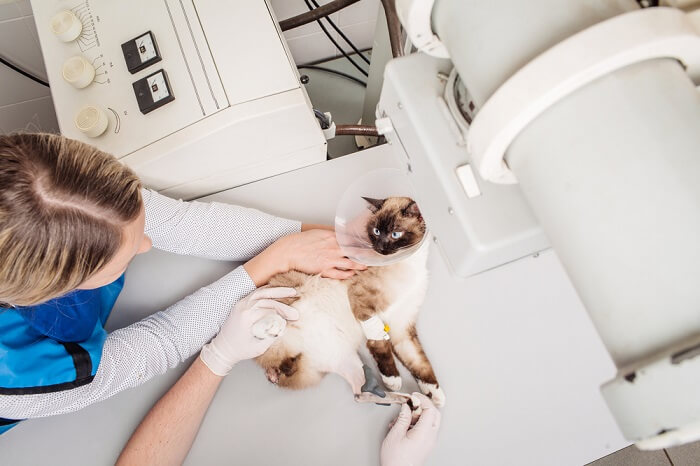
Because pancreatitis symptoms are so vague, your veterinarian will need to perform several diagnostic tests to figure out exactly what’s going on with your cat.
Unfortunately, basic diagnostic tests (routine bloodwork, x-rays, abdominal ultrasound) usually don’t indicate pancreatitis one way or the other. They might indicate that something is abnormal, but not specifically that a cat has pancreatitis.
A biopsy of the pancreas can help with the diagnosis. However, taking a biopsy can further inflame the pancreas, worsening the pancreatitis. Plus, if a cat is already extremely ill, anesthetizing them to take a biopsy could put their life at risk.
The most definitive diagnostic test for feline pancreatitis is a blood test called the feline pancreatic lipase immunoreactivity (fPLI) test—quite the mouthful!
This test measures the levels of lipase, a digestive enzyme released by the pancreas. Even with this test’s accuracy for diagnosing feline pancreatitis, the results still need to be evaluated along with all other diagnostic and physical exam findings to make the final diagnosis.
Treating Pancreatitis
Treating pancreatitis in cats is all about supportive care. Of course, it’s ideal to identify and eliminate the underlying cause, but that won’t be possible in many cases. The cat pancreatitis survival rate is estimated at around 77% according to the Natural Library of Medicine.
One aspect of supportive care for feline pancreatitis is intravenous fluid therapy.
This rehydrates a cat’s body, flushes the body of inflammatory chemicals, and ensures adequate blood flow to and through the pancreas.
For vomiting cats, it has been traditionally recommended to “rest” the pancreas for 2–3 days by withholding food and water.
However, there is a newer thought that the GI tract heals better when food is moving through it. If a veterinarian decides to withhold food and water, the cat must start eating again after that resting period. This is because cats who don’t eat for several days can develop hepatic lipidosis (fatty liver syndrome). You definitely don’t want your cat to have another serious disease on top of pancreatitis.
Appetite stimulant medications can improve a sick cat’s appetite.
If those don’t work, then a feeding tube will be necessary. Either way, a cat with pancreatitis needs nutritional support to regain strength and stave off hepatic lipidosis.
In addition to these supportive measures, pain medications are given to relieve abdominal pain.
A cat might not show pain, but it’s likely there and needs to be treated. Anti-nausea medications can also be given.
For cats who are only mildly ill or aren’t showing any symptoms, they don’t need all of these supportive treatments. For these cats, a diet with high-quality protein and a moderate amount of fat, and perhaps some probiotics, is typically all that’s needed. They might need an appetite stimulant, though, if they’re refusing to eat.
Prognosis
The prognosis is good for mild pancreatitis and guarded to poor for severe cases.
Cats who recover from their first bout of pancreatitis will likely experience it again. Unfortunately, chronic pancreatitis increasingly damages the pancreas, leading to decreased pancreatic function over time. Also, chronic pancreatitis can put cats at risk of other diseases, like hepatic lipidosis, diabetes mellitus, and inflammatory bowel disease.
Summing it Up
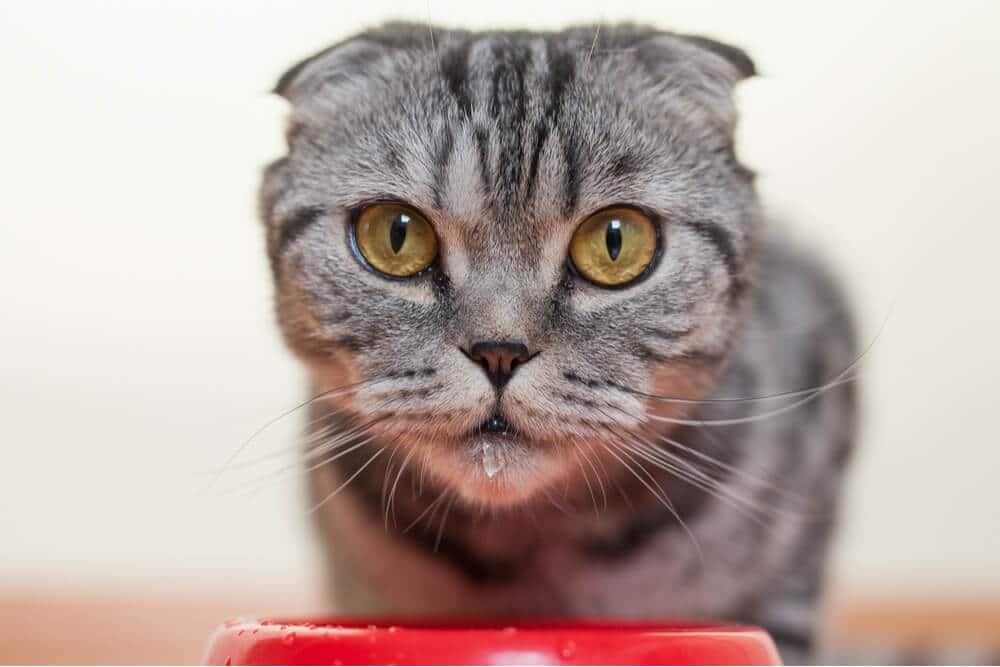
Feline pancreatitis is a serious disease that can be difficult to diagnose and treat. Depending on the disease severity, a sick cat can need intense veterinary treatment.
Even though it might be tricky to know if your cat has pancreatitis, it is best to take your cat to your veterinarian if you notice any pancreatitis symptoms (anorexia, lethargy, etc.) Your vet will do everything they can to nurse your cat back to good health.





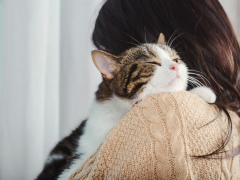
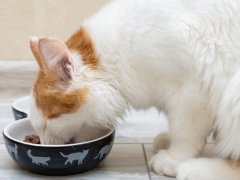
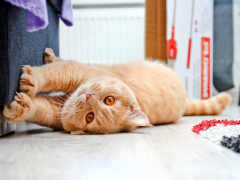
How long does it take to see male cats after treatment rebound from their pancreatic illness ?
Hi Mark, it really depends on the individual case and underlying causes of the condition. Some cats will never have pancreatitis again after recovering from their first bout, while others have flare-ups for years. Sex is not known to have any impact on the likelihood of recurring or chronic pancreatitis. If you have a cat in this situation, it’s best to talk with your vet about their individual prognosis. – Mallory
This article was such a help! My kitty got this diagnosis. There’s also dietary recommendations on this site, for specific foods to try. Our vet recommended only one kind of food, and of course I don’t know any cat that would be happy with that, lol. I tried out the recommended foods, gives my kitty variety – and they have been excellent. Her condition slowly improved. A year later, her blood work is almost normal. I’m really grateful for this website. Thank you, vets and staff.
That’s great! So happy to hear that it’s all working out.
Thank you SO MUCH for this information. Both me and my kitty are dealing with some issues related to pancreatitis. I knew a bit about its presentation in humans from my own experience (https://www.premiermedicalhv.com/divisions/services/pancreatitis/), but not much about felines. Thank you for this thorough piece!
You’re quite welcome. I’m glad that the article was helpful to you.
My cat was diagnosed with diabetes- is this caused by pancreatitis? My vet didn’t mention pancreatitis but did put her on insulin injections to bring her blood sugar levels down.
Hi Anita,
Pancreatitis is a potential cause of diabetes in cats. A cat can have pancreatitis and diabetes at the same time, so it is possible that damage to the pancreas by pancreatitis can lead to diabetes. Talk to your veterinarian if you are concerned that your cat has pancreatitis.
Can you recommend any homeopathic treatment for a cat throwing up because of Pancreatitis? Or any specific herbs, probiotics? thank you.
Hello Lena, I’m afraid we can’t give any sort of treatment advice here other than what’s been shared in the article! I’d recommend talking with a vet in your local area.
My 12 year old female cat has been diagnosed with having pancreatic. She is now on the mend She was vomiting every time she ate . My question is this …. have been feeding her wet food only and adding a little water because she hasn’t been drinking. What is your advice on how I should feed her ?
Hi, Cecile. We cannot provide specific feeding advice for your cat through this comment platform. However, wet food is a great option for cats who may need extra enticement to eat. In addition, wet food’s high moisture content helps cats stay well hydrated, especially if they aren’t drinking much water on their own. Your veterinarian will be your best resource on what to feed your cat to ensure that she is getting the proper nutrition.